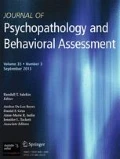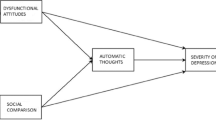Abstract
Cognitive assessment of depression is not well advanced and the evidence for the validity and reliability of measures is incomplete. This study examined two cognitive assessments of depression-the Automatic Thoughts Questionnaire (ATQ) and the Dysfunctional Attitudes Scale (DAS). There were two major objectives of this study. The first objective was to examine the ability of these two measures of cognitions to discriminate depressive symptomatology within a variety of sample populations-university undergraduate students, medical and psychiatric outpatients, and acute psychiatric inpatients. The second objective was to examine the ability of the ATQ and DAS succesfully to classify depressed and nondepressed patients. The results of this study suggest that the ATQ is a sensitive and specific measure of depression. Nonspecificity to the ATQ, however, was demonstrated in the substance abuse disorder group and the personality disorder group. In contrast, the DAS, although correlated with depressive symptomatology, was not found to be specific to depression.
Similar content being viewed by others
References
American Psychiatric Association (1980).Diagnostic and statistical manual of mental disorders (3rd ed.); Washington, DC: APA.
Beck, A. T., & Beasmesder, A. (1974). Assessment of depression, the Depression Inventory. In P. Pichot (Ed.),Psychological Measurement in Psychopharmacology and Modern Pharmacopsychiatry (Vol. 7, pp. 151–169). Basel, Switzerland: Kerger.
Beck, A., Ward, C., Mendelson, M., Mock, J., & Erbaugh, J. (1961). An inventory for measuring depression.Archives of General Psychiatry, 4, 561–571.
Beck, A. T., Rush, A. J., Shaw, B. F., & Emery, G. (1979).Cognitive therapy of depression. New York: Guilford Press.
Bryson, S. E., & Pilan, D. J. (1984). Sex differences in depression and the method of administering the Beck Depression Inventory.Journal of Clinical Psychology, 40, 529–534.
Buckalew, L. W., & Pearson, W. H. (1981). Determination of critical observed frequencies in chi square.Bulletin of the Psychonomic Society, 18(5), 289–290.
Bumberry, W., Oliver, J., & McClure, J. (1978). Validation of the Beck depression inventory in a university population using psychiatric estimate as the criterion.Journal of Consulting and Clinical Psychology, 46, 150–155.
Clark, D. (1988). The validity of measures of cognition: A review of the literature.Cognitive Therapy and Research, 12, 1–20.
Dobson, K. S., & Shaw, B. F. (1986). Cognitive assessment with major depressive disorders.Cognitive Therapy and Research, 10, 13–24.
Eaves, G., & Rush, A. (1984). Cognitive patterns in symptomatic and remitted unipolar major depression.Journal of Abnormal Psychology, 93, 31–40.
Free, M., & Oei, T. P. S. (1989). Biological and psychological processes in the treatment and maintenance of depression.Clinical Psychology Review, 9, 653–688.
Gallagher, D., Nies, G., & Thompson, L. W. (1982). Reliability of the Beck Depression Inventory with older adults.Journal of Consulting and Clinical Psychology, 50, 152–153.
Hamilton, E., & Abramson, L. (1983). Cognitive patterns and major depressive disorder: A longitudinal study in a hospital setting.Journal of Abnormal Psychology, 92, 173–184.
Harrell, T., & Ryon, N. (1983). Cognitive-behavioral assessment of depression: Clinical validation of the automatic thoughts questionnaire.Journal of Consulting & Clinical Psychology,51, 721–725.
Hesselbrock, M. N., Hesselbrock, V. M., Tennen, H., Meyer, R. E., & Workman, J. (1983). Methodological considerations in the assessment of depression in alcoholics.Journal of Consulting and Clinical Psychology, 51, 399–458.
Hollon, S. D. & Beck, A. T. (1979). Cognitive therapy of depression. In P. C. Kendall & S. D. Hollon (Eds.),Cognitive-Behavioral Interventions: Theory, Research and Procedures (pp. 153–203). New York: Academic Press.
Hollon, S. D., & Kendall, P. (1980). Cognitive self statements in depression: Development of an automatic thoughts questionnaire.Cognitive Therapy and Research, 4, 383–395.
Hollon, S., Kendall, P., & Lumry, A. (1986). Specificity of depressotypic cognitions in clinical depression.Journal of Abnormal Psychology, 95, 52–59.
Kendall, P. (1981). Assessment and cognitive-behavioral interventions: Purposes, proposals and problems. In P. C. Kendall & S. D. Hollon (Eds.),Assessment Strategies for Cognitive Behavioral Interventions. New York: Academic Press.
Kendall, P., & Korgeski, G. (1979). Assessment and cognitive-behavioral interventions.Cognitive Therapy and Research, 3(1), 1–21.
Oei, T. P. S., Duckham, S., & Free, M. (1989). Does cognitive behavior therapy support cognitive model of depression?Behavior Change, 6, 70–75.
Oei, T. P. S., Lim, B., & Young, R. (1989). The efficacy of cognitive behavior therapy in the treatment of problem drinking. In B. Grenzer & N. Solowiz (Eds.),Cognitive behavioral approaches to the treatment of drugs and alcohol problems (Monograph No. 7). Sydney, Australia: National Drug and Alcohol Centre, University of New South Wales.
Parker, G., Bradshaw, G., & Blignault, L. (1984). Dysfunctional attitudes: Measurement, significant constructs and links with depression.Acta Psychiatrica Scandinavica, 70, 90–96.
Ross, S. M., Gottfredson, O. K., Christensen, P., & Weaver, R. (1986). Cognitive self-statements in depression: Findings across clinical populations.Cognitive Therapy and Research, 10, 159–165.
Rush, A. J., Beck, A. T., Kovacs, M., & Hollon, S. D. (1977). Comparative efficacy of cognitive therapy and pharmacotherapy in the treatment of depressed outpatients.Cognitive Therapy and Research, 1, 17–37.
Shaw, B. F. (1977). Comparison of cognitive therapy and behavior therapy in the treatment of depression.Journal of Consulting and Clinical Psychology, 45, 543–551.
Silverman, J., Silverman, J., & Eardley, D. (1984). Do maladaptive attitudes cause depression?Archives of General Psychiatry, 41, 28–30.
Taylor, F. G., & Marshall, W. L. (1977). Experimental analysis of a cognitive-behavioral therapy for depression.Cognitive Therapy and Research, 1, 59–72.
Weissman, A. (1979). The dysfunctional attitude scale: A validation study (Doctoral dissertation, University of Pennsylvania).Dissertation Abstracts International, 40, 1389–1390b.
Weissman, A. N., & Beck, A. J. (1978).Development and validation of the dysfunctional attitude scale: A preliminary investigation. Paper presented at the Annual Meeting of the American Educational Research Association, Toronto.
Author information
Authors and Affiliations
Additional information
Part of this project is supported by a Special Project Grant from the University of Queensland to Dr. Oei.
Rights and permissions
About this article
Cite this article
Hill, C.V., Oei, T.P.S. & Hill, M.A. An empirical investigation of the specificity and sensitivity of the automatic thoughts questionnaire and dysfunctional attitudes scale. J Psychopathol Behav Assess 11, 291–311 (1989). https://doi.org/10.1007/BF00961529
Accepted:
Issue Date:
DOI: https://doi.org/10.1007/BF00961529



